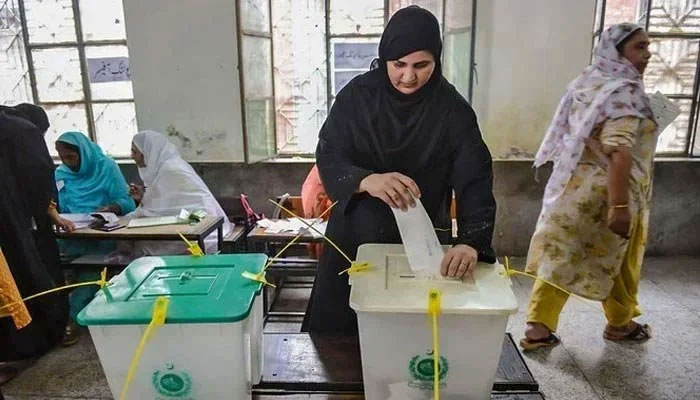Hard to say after May 9 riots if polls possible on Oct 8, ECP tells SC
CJP asks how long democracy would be sacrificed and people deprived of their right to vote
ISLAMABAD: Chief Justice of Pakistan (CJP) Umer Ata Bandial Thursday observed that the right to vote was one of the basic fundamental rights of the people enshrined in the Constitution and asked how long democracy would be sacrificed and people deprived of exercising their right to franchise.
This observation from the country’s top judge came during the hearing of a review petition filed by the Election Commission of Pakistan against its April 4 order setting May 14 as the date for holding elections in Punjab.
The chief justice headed the three-member bench comprising Justice Ijazul Ahsen and Justice Munib Akhtar.
Addressing the counsel for the electoral body, the chief justice said besides other fundamental rights, the right to vote was one of the basic fundamental rights of the people enshrined in the Constitution.
He said democracy was sacrificed many a time in history and its consequences followed.
“If you further delay the polls, negative forces will come into action and deprive the people of their fundamental rights,” he told the ECP counsel Sajeel Shehryar Swati.
The counsel for the electoral watchdog continued his arguments.
The chief justice asked Sajeel as to when that limit would come and he would say that he could not go further for delaying the elections.
He further asked as to how it was possible in the Constitution that an elected government should remain in power for six months and the caretaker government for four and a half years.
“Recently, local government polls were held in Balochistan and we read in newspapers that the turnout of polls remained 60 percent despite the security situation,” CJP observed.
Swati, however, contended that the Election Commission had fixed October 8 as the date for elections in view of facts.
Justice Munib Akhtar said arranging and holding elections was not discretion but the constitutional obligation of the electoral watchdog.
At the outset of the hearing the ECP counsel submitted that the Supreme Courts Rules could not curtail the constitutional powers.
Justice Ijazul Ahsen, however, asked as to how the rules reduced the judicial constitutional powers to which the ECP lawyer submitted that a full court of the apex court in several cases had declared that the scope of the review was not “limited.
At this, Justice Munib Akhtar interrupted and asked if they accepted his logic, and then the apex court rules would become null and void.
Swati submitted that the ECP review petition was in fact a continuation of the main case regarding the holding of elections.
The chief justice, however, told the counsel to come to the main points rather than skating round the issue.
Advancing his arguments, the counsel contended that it was necessary to have a caretaker government in place for the elections, and the procedure for appointing a caretaker government was provided in the Constitution.
At this, Justice Ijazul Ahsan asked whether the caretaker setup would remain in power for four and a half years if the provincial assembly was dissolved in six months.
He further asked if the caretaker government would wait for four and a half years for the dissolution of the National Assembly.
Swati, however, replied that the caretaker government would work in the respective province for four and a half years.
Elaborating his stance, he contended that an article of the Constitution could not be violated by other actions adding that Article 254 gave legal support to a delay of 90 days.
Justice Ijazul Ahsen asked the counsel whether the caretaker government could stay as long as it wanted. The ECP counsel replied that the tenure of the caretaker government would be determined according to the circumstances.
He further said in light of the situation unfolding from May 9 situation, it would be determined whether the elections could be held on October 8.
Justice Munib Akhtar reminded the counsel that earlier, the electoral watchdog had informed the court that it could arrange and conduct elections upon provision of sufficient funds but now it was claiming that polls were not possible, citing principles of the Constitution.
He asked as to why the ECP did not earlier say that the elections were not possible even with the present resources.
Swati, however, claimed that they had already raised the instant point in their reply submitted to the court. However, the chief justice again told the counsel that the electoral watchdog did not inform the president or the provincial governor about the facts and now for two days now he was arguing in favour of the case being reheard in the review petition.
Swati submitted that October 8 was given for holding the elections after keeping in view the political environment adding that the Commission had expressed concern over the protests of May 9.
Justice Ijaz said the Election Commission was back-burnering the command of the Constitution by linking the elections with May 9 incident.
The chief justice observed that the Election Commission should not have accepted the finance ministry’s excuses and sought a concrete explanation from the government.
Later, the court adjourned the hearing until Monday.
-
 Cardi B Hits Back Hard At Critics Of Her Little Miss Drama Tour
Cardi B Hits Back Hard At Critics Of Her Little Miss Drama Tour -
 King Charles Sees Andrew Going To Jail As Chance To Protect Monarchy
King Charles Sees Andrew Going To Jail As Chance To Protect Monarchy -
 NJ Transit Bus And Train Lines Operating Again On Modified Schedule After Winter Storm
NJ Transit Bus And Train Lines Operating Again On Modified Schedule After Winter Storm -
 Peter Mandelson Freed On Bail Following Arrest In Public Office Misconduct Case Linked To Epstein
Peter Mandelson Freed On Bail Following Arrest In Public Office Misconduct Case Linked To Epstein -
 Trump Warns Trading Partners: Countries 'playing Games’ After Court Ruling Will Face Even Higher Tariffs
Trump Warns Trading Partners: Countries 'playing Games’ After Court Ruling Will Face Even Higher Tariffs -
 Robert Carradine, 'Revenge Of The Nerds' Star, Passes Away At 71 After Decades-long Battle With Bipolar Disorder
Robert Carradine, 'Revenge Of The Nerds' Star, Passes Away At 71 After Decades-long Battle With Bipolar Disorder -
 Alex De Minaur Faces Surprise Elimination In Acapulco Thriller By Patrick Kypson
Alex De Minaur Faces Surprise Elimination In Acapulco Thriller By Patrick Kypson -
 Ethan Hawke Raises Eyebrows With Risque Response To Question About Eating In Bed
Ethan Hawke Raises Eyebrows With Risque Response To Question About Eating In Bed -
 Princess Beatrice, Eugenie Enter Crisis Talks As Parents Sins Start Bleeding Onto Them: ‘Help Me Girls!’
Princess Beatrice, Eugenie Enter Crisis Talks As Parents Sins Start Bleeding Onto Them: ‘Help Me Girls!’ -
 US Ambassador To France Charles Kushner Barred From Meeting French Government After Missing Meeting
US Ambassador To France Charles Kushner Barred From Meeting French Government After Missing Meeting -
 Moby Sings Praises Of Eminem After Calling Rapper 'misogynist, Homophobe, Racist And Antisemite' 25 Years Ago
Moby Sings Praises Of Eminem After Calling Rapper 'misogynist, Homophobe, Racist And Antisemite' 25 Years Ago -
 'Tediously Monastic' Moby Reveals How Spiritual Discipline Impacted His Love Life
'Tediously Monastic' Moby Reveals How Spiritual Discipline Impacted His Love Life -
 New Zealand PM Christopher Luxon Backs Removing Ex-Prince Andrew From Line Of Succession
New Zealand PM Christopher Luxon Backs Removing Ex-Prince Andrew From Line Of Succession -
 Bella Hadid Looks Back On Opportunities She Lost In A Year Amid Lyme Treatment
Bella Hadid Looks Back On Opportunities She Lost In A Year Amid Lyme Treatment -
 Meghan Markle’s Family Shares Important News Amid Estrangement
Meghan Markle’s Family Shares Important News Amid Estrangement -
 Charley Crockett's Canadian Tour Cancelled After Being Denied Entry Into Canada Over Past Felony Conviction
Charley Crockett's Canadian Tour Cancelled After Being Denied Entry Into Canada Over Past Felony Conviction




